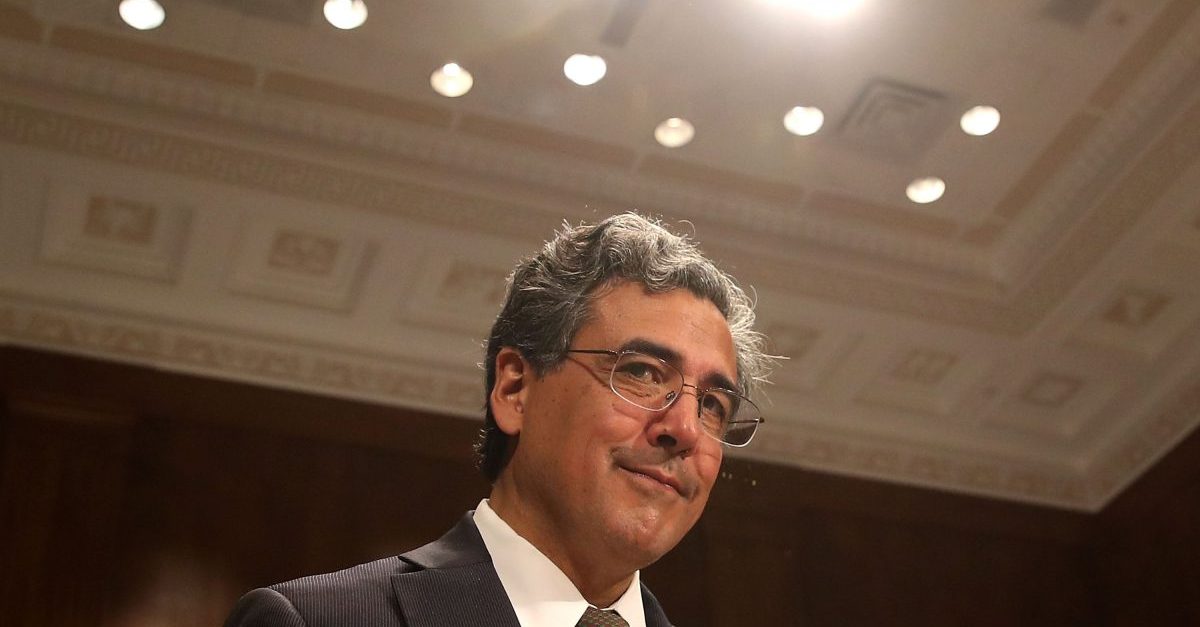
President Donald Trump‘s Solicitor General Noel Francisco said something that wasn’t quite true during oral arguments in front of the Supreme Court recently. Now he’s gone and corrected himself.
While attempting to defend the administration’s travel ban, Francisco made reference to a statement by Trump that doesn’t actually exist. First a bit of backstory.
During last week’s arguments in Trump v. Hawaii, the challengers asserted two novel legal theories: (1) that the ban has an anti-Muslim bias that could have been cured had Trump simply retracted his prejudicial comments targeting Muslims prior to issuing the ban; and (2) that Trump’s anti-Muslim animus undergirding the ban could essentially be written out were he to disavow his prior comments now.
The challengers maintain that such a disavowal, however unlikely, would legally wash away the anti-Muslim taint of the present ban and make Trump’s order constitutionally firm. This argument was apparently so interesting–and feasibly weighty–that it provoked Francisco to say the following in response:
My brother’s recognition that, if the president were to say tomorrow that he was sorry, all of this would go away. Well, the president has made crystal-clear on September 25 that he had no intention of imposing the Muslim ban. He has made crystal-clear that Muslims in this country are great Americans and there are many, many Muslim countries who love this country, and he has praised Islam as one of the great countries [sic] of the world.
Legal observers quickly searched for Trump’s Muslim-centric mea culpa. It was nowhere to be found because it doesn’t exist. No such statement was made on September 25. Trump did once refer to Islam as “one of the world’s great faiths,” but not on September 25.
Cue Tuesday’s correction letter.
Addressed to the Supreme Court’s Clerk Scott S. Harris, Francisco writes:
At oral argument in [Trump v. Hawaii] last week, I referred during my rebuttal to a statement by the President “on September 25.” Transcript 81: 17-19. I intended to refer to the President’s statement on January 25, 2017, that is cited in the government’s reply brief at page 28, note 8. I would appreciate if you could distribute this letter to the Members of the Court.
Here’s what Trump said during his January 25, 2017 interview with ABC’s David Muir:
DAVID MUIR: Mr. President, I wanna ask you about refugees. You’re about to sign a sweeping executive action to suspend immigration to this country.
PRESIDENT TRUMP: Right.
DAVID MUIR: Who are we talking about? Is this the Muslim ban?
PRESIDENT TRUMP: We’re talking about — no it’s not the Muslim ban. But it’s countries that have tremendous terror. It’s countries that we’re going to be spelling out in a little while in the same speech. And it’s countries that people are going to come in and cause us tremendous problems. Our country has enough problems without allowing people to come in who, in many cases or in some cases, are looking to do tremendous destruction.
Let’s be “crystal-clear” here: nowhere in the above statement does Trump repudiate his campaign promise to impose a Muslim ban. Here, he’s apparently disagreeing with the rhetorical frame used by one reporter. While Trump did say that his executive order was not a Muslim ban, he did not say anything here approaching the idea that Muslims are “great Americans.” In any event, the January 25, 2017 statement is not “crystal-clear” about anything and simply does not contain the various other ideas Francisco erroneously attributed to Trump. Thus, the letter.
A typical Supreme Court term might see one or two such letters being filed with the nation’s highest tribunal. University of Texas Law Professor Steve Vladeck said it was “rare” that government lawyers are the ones filing those letters, though. Why? Because they usually don’t make these sorts of mistakes.
[image via Mark Wilson/Getty Images]